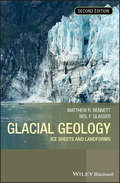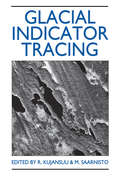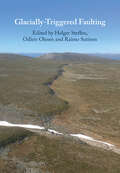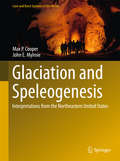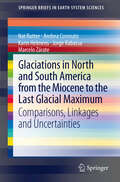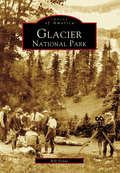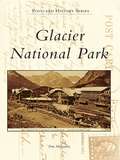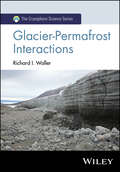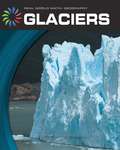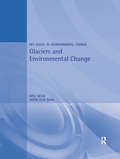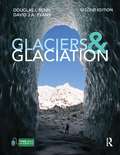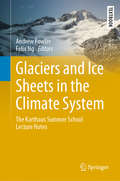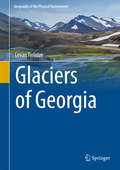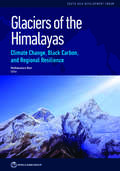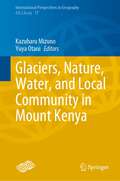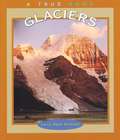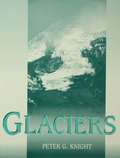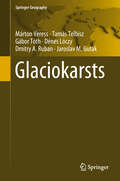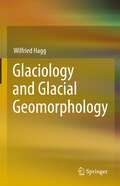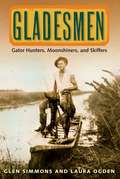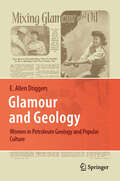- Table View
- List View
Glacial Geology
by Neil F. Glasser Matthew M. BennettThe new Second Edition of Glacial Geology provides a modern, comprehensive summary of glacial geology and geomorphology. It is has been thoroughly revised and updated from the original First Edition. This book will appeal to all students interested in the landforms and sediments that make up glacial landscapes.The aim of the book is to outline glacial landforms and sediments and to provide the reader with the tools required to interpret glacial landscapes. It describes how glaciers work and how the processes of glacial erosion and deposition which operate within them are recorded in the glacial landscape.The Second Edition is presented in the same clear and concise format as the First Edition, providing detailed explanations that are not cluttered with unnecessary detail. Additions include a new chapter on Glaciations around the Globe, demonstrating the range of glacial environments present on Earth today and a new chapter on Palaeoglaciology, explaining how glacial landforms and sediments are used in ice-sheet reconstructions. Like the original book, text boxes are used throughout to explain key concepts and to introduce students to case study material from the glacial literature. Newly updated sections on Further Reading are also included at the end of each chapter to point the reader towards key references. The book is illustrated throughout with colour photographs and illustrations.
Glacial Indicator Tracing
by RAIMO KUJANSUU and MATII SAARNISTOThe final report of the 1989 Finnish Work Group 9 of the INQUA on the Genesis and Lithology of Glacial Sediments entitled Glacigenic deposits as indicators of glacial movements and their use for indicator tracing in the search for ore deposits . Emphasizes the significance of extensive application o
Glacially-Triggered Faulting
by Holger Steffen Odleiv Olesen Raimo SutinenGlacially triggered faulting describes movement of pre-existing faults caused by a combination of tectonic and glacially induced isostatic stresses. The most impressive fault-scarps are found in northern Europe, assumed to be reactivated at the end of the deglaciation. This view has been challenged as new faults have been discovered globally with advanced techniques such as LiDAR, and fault activity dating has shown several phases of reactivation thousands of years after deglaciation ended. This book summarizes the current state-of-the-art research in glacially triggered faulting, discussing the theoretical aspects that explain the presence of glacially induced structures and reviews the geological, geophysical, geodetic and geomorphological investigation methods. Written by a team of international experts, it provides the first global overview of confirmed and proposed glacially induced faults, and provides an outline for modelling these stresses and features. It is a go-to reference for geoscientists and engineers interested in ice sheet-solid Earth interaction.
Glaciation and Speleogenesis
by Max P. Cooper John E. MylroieFocusing on glaciation and speleogenesis in the region of New York and New England, this book serves as an example of a karst region that has experienced large-scale continental glaciation. It reviews the literature on the controls of glaciation on karst development, exploring examples from the marbles of the Adirondacks, New England and eastern New York, the Ordovician strata of northern New York and the Siluro-Devonian strata of central New York. Each of these areas is examined in detail, demonstrating the evolution of thought on glaciated karst through case studies of individual caves as well as larger cave systems. Additionally, this book describes the geology and glaciation, the evolution of karst landscapes from pre-glacial times to the present and human interaction with the caves in the region.
Glaciations in North and South America from the Miocene to the Last Glacial Maximum
by Marcelo Zárate Andrea Coronato Karin Helmens Jorge Rabassa Nat RutterImproved dating methods have increased our ability to more precisely determine the timing and durations of glaciations. Utilizing glacial and loess deposits, we have compared glaciations that occurred in North and South America in order to determine if events are synchronous or not, to explore forcing mechanisms, and to compare glaciations with cold periods of the Marine Oxygen Isotope stages and the loess/paleosol records of China. Stratigraphic sections containing a variety of glacial deposits, some with interbedded volcanics, as well as loess deposits, were used in reconstructing the glacial history. The Late Pleistocene (Brunhes Chron) Last Glacial Maximum is recognized in mountain and continental areas of North America but only in the mountains of South America. Commonly our comparisons indicate roughly synchronous glaciations on the two continents, whereas other glaciations are more elusive and difficult to compare. Although our comparisons are at low resolutions, the results suggest that Milankovitch forcing is most likely the dominant trigger for hemispheric glaciation modified by local factors.
Glacier National Park
by Bill YenneGlacier National Park is a majestic million acres of towering mountains, ancient glaciers, and amazing biodiversity. Located astride both the Continental Divide and Hudson Bay Divide, Glacier contains Triple Divide Peak, the only point in North America from which the waters drain into three oceans. The land that George Bird Grinnell called the "Crown of the Continent" and that John Muir described as "the best care-killing scenery on the continent" has beendelighting visitors since well before it was set aside as a park in 1910. Through the years, countless people have come to Glacier to hike its nearly thousand miles of trails, marvel at its unrivalled scenery, and drive the Going-to-the-Sun Road, America's most spectacular alpine highway. Glacier is also home to remote mountain chalets and magnificent grand lodges. While most national parks have a singular signature lodge, Glacier has three.
Glacier National Park
by Tom MulvaneyPres. William Howard Taft signed the bill creating Glacier National Park in 1910, and a wilderness paradise in northwestern Montana was born. This book illustrates the park's evolution, from the Great Northern Railroad days, Native American presence, lodges, chalets, and camps, to majestic scenery and wildlife--all in vintage postcards. The opening of Glacier National Park coincided with the popularity of postcards across the nation, and hence this visual documentation of Glacier's many wonders is thorough and encompassing. With the celebration of its centennial in 2010, Glacier National Park continues to provide us with one of the last best places to visit.
Glacier-Permafrost Interactions (The Cryosphere Science Series)
by Richard I. WallerGlacier-Permafrost Interactions A systematic exploration of the interactions between glaciers and permafrost In Glacier-Permafrost Interactions, experienced glaciologist Richard I. Waller delivers a comprehensive discussion of the interactions between glaciers and permafrost. The book is highly relevant to contemporary debates regarding ongoing recession of glaciers and the degradation of permafrost in the face of global warming. By integrating modern-era observations with findings from Quaternary science, this book demonstrates how glaciers and permafrost can interact and behave as an integrated system. This summary of the current thinking and emerging research on glacier-permafrost interaction also provides: Comprehensive discussions of permafrost in modern and ancient glacial environments A focused review of the distinctive characteristics of glaciers found in permafrost environments An integrated overview of the nature and impacts of glacier-permafrost interactions on the hydrology and dynamic behaviour of glaciers and their landscape expression A survey of current research efforts and future directions in the field Lying at the boundary between a research monograph and an advanced textbook, Glacier-Permafrost Interactions contributes to the future development of this rapidly evolving field by incorporating new approaches and ideas while still offering a summary of the current state of knowledge. It is perfect for advanced undergraduate students, postgraduate students, researchers, and professionals with an interest in polar and alpine environments.
Glaciers
by Wendell V. TangbornExplains how and where glaciers form, how they move, and how they shape the land.
Glaciers (21st Century Skills Library: Real World Math)
by Barbara SomervillThis book uses math and science to help students learn about glaciers. Math challenge questions provide students with the opportunity to apply math skills as they learn about the characteristics of glaciers. Introduces glaciers, including how they were formed, how they have affected geography over the years, and why receding glaciers are a global climate concern.
Glaciers Are Alive
by Debbie S. MillerThis environmental picture book introduces young science and nature lovers to the wonders of glaciers, the wildlife that call them home, and how important they are to the health of our planet.A glacier may look forbidding and empty, but it supports abundant life. Follow a glacier as it flows from mountain to ocean, providing a home for ice worms, birds, bears, and more. Where the glacier meets the sea, it creates a rich environment for marine life such as seals, otters, and whales. As glaciers melt at a rapid rate due to climate change, their disappearance impacts not only the wildlife that calls them home, but also all life on earth. Glaciers are alive, and they need our protection!
Glaciers and Environmental Change (Key Issues In Environmental Change Ser.)
by Atle Nesje Svein Olat DahlThis authoritative new text provides a thorough, updated account of glaciers and ice sheets as monitors and indicators of environmental change. It examines the record of environmental change within glaciers and ice sheets, and that of past environments left by retreating glaciers. These themes are examined within the context of environmental change in general and global climate change in particular. Methods of using palaeoenvironmental records are assessed and the implications for future environmental change are discussed. Evidence from glacier ice left in the landscape or within the geological record, provides one of the most important sources of information on environmental change. 'Glaciers and Environmental Change' is a comprehensive account of glaciers andice sheets as monitors and indictaors of environmental change. Based on the latest research, this book consolidates a diverse range of data and explains their applications. it also assesses methods of using palaeoenvironmental records. This authoritative new text examines not only the records of environmental change within glaciers but also that of past environments left by retreating glaciers. These themes are examined within the context of contemporary debates in environmental change and the volume also seeks to draw conclusions concernign past, present and future climatic change in relation to glaciers.
Glaciers and Glaciation, 2nd edition
by David J Evans Douglas BennGlaciers and Glaciation is the classic textbook for all students of glaciation. Stimulating and accessible, it has established a reputation as a comprehensive and essential resource.In this new edition, the text, references and illustrations have been thoroughly updated to give today's reader an up-to-the minute overview of the nature, origin and behaviour of glaciers and the geological and geomorphological evidence for their past history on earth.The first part of the book investigates the processes involved in forming glacier ice, the nature of glacier-climate relationships, the mechanisms of glacier flow and the interactions of glaciers with other natural systems such as rivers, lakes and oceans.In the second part, the emphasis moves to landforms and sediment, the interpretation of the earth's glacial legacy and the reconstruction of glacial depositional environments and palaeoglaciology.
Glaciers and Ice Sheets in the Climate System: The Karthaus Summer School Lecture Notes (Springer Textbooks in Earth Sciences, Geography and Environment)
by Andrew Fowler Felix NgOur realisation of how profoundly glaciers and ice sheets respond to climate change and impact sea level and the environment has propelled their study to the forefront of Earth system science. Aspects of this multidisciplinary endeavour now constitute major areas of research. This book is named after the international summer school held annually in the beautiful alpine village of Karthaus, Northern Italy, and consists of twenty chapters based on lectures from the school. They cover theory, methods, and observations, and introduce readers to essential glaciological topics such as ice-flow dynamics, polar meteorology, mass balance, ice-core analysis, paleoclimatology, remote sensing and geophysical methods, glacial isostatic adjustment, modern and past glacial fluctuations, and ice sheet reconstruction. The chapters were written by thirty-four contributing authors who are leading international authorities in their fields. The book can be used as a graduate-level textbook for a university course, and as a valuable reference guide for practising glaciologists and climate scientists.
Glaciers of Georgia
by Levan TielidzeThis book gives the most detailed and comprehensive insights into the morphology, morphometry and dynamics of glaciers in the Georgian Caucasus region up to date. It examines the variability of valley glaciers after the Little Ice Age maximum and identifies glacial dynamics during historical periods. The reconstruction of glaciation in the Late Pleistocene and Holocene was conducted based on long lasting detailed glacial-geomorphological observations by the author. It further analyses moraine structures, river terraces, geodynamics of the relief, and snow and firn line locations derived from field surveys in most glacier basins in the southern and northern slopes of the Georgian Caucasus. A whole set of methodological approaches was applied including remote sensing and GIS, glacio-geomorphological, cartographical, aerial image processing and petrographic methods, unveiling accurate information about glaciers difficult to access, e. g. in the Abkhazeti and Tskhinvali regions. The book provides a full database of Georgia's modern glaciation and displays a set of compiled maps of the distribution of the Late Pleistocene glaciation of the Georgian Caucasus.
Glaciers of the Himalayas: Climate Change, Black Carbon, and Regional Resilience (South Asia Development Forum)
by Muthukumara ManiMelting glaciers and the loss of seasonal snow pose significant risks to the stability of water resources in South Asia. The 55,000 glaciers in the Himalaya, Karakoram, and Hindu Kush (HKHK) mountain ranges store more freshwater than any region outside of the North and South Poles. Their ice reserves feed into three major river basins in South Asia—the Indus, Ganges, and Brahmaputra—that are home to 750 million people. One major regional driver of the accelerating glacier melt is climate change, which is altering the patterns of temperature and precipitation. A second driver may be deposits of anthropogenic black carbon (BC), which increase the glaciers’ absorption of solar radiation and raise air temperatures. BC is generated by human activity both inside and outside of South Asia, and policy actions taken by the South Asian countries themselves may meaningfully reduce it. Glaciers of the Himalayas: Climate Change, Black Carbon, and Regional Resilience investigates the extent to which the BC reduction policies of South Asian countries may affect glacier formation and melt within the context of a changing global climate. It assesses the relative impact of each source of black carbon on snow and glacier dynamics. The authors simulate how BC emissions interact with projected climate scenarios. They also estimate the extent to which these glacial processes affect water resources in downstream areas of these river basins and present scenarios until 2040. Their policy recommendations include the following: Full implementation of current BC emissions policies can significantly reduce BC deposition in the region; additional reductions can be realized by enacting and implementing new policies that are economically and technically feasible. Improving the efficiency of brick kilns could be key to managing BC, and modest up-front investments could pay off quickly. Cleaner cookstoves and cleaner fuels can help to reduce BC and improve local air quality. Improving institutions for basin-based water management and using price signals are essential elements of more efficient water management. Careful management of hydropower and storage resources will require developers to factor in changing water flows and consider planning for large storage projects to stabilize water availability. Regional cooperation and the exchange of information can be an effective transboundary solution, helping countries to manage glaciers and related natural assets collaboratively. New policies are needed to reverse trends like the melting of glaciers. Success will require an active, agile cooperation between researchers and policy makers. To support an open dialogue, the model developed and used in this book is an open-source, state-of-the-art model that is available for others to use and improve on.
Glaciers of the Karakoram Himalaya
by Kenneth HewittThe Karakoram contains the greatest concentration of glaciers and most of the largest ice masses outside high latitudes. They comprise major stores and sources of fresh water in an otherwise extreme, continental, dry region. As many as 200 million people living downstream, in the valleys of the Indus and Yarkand Rivers, depend on melt waters from snow and ice. They are at risk from climate-change impacts on glaciers and water supply, and from hazards such as glacial lake outburst floods. Useful research initiatives go back to the nineteenth century, but coverage has generally been limited geographically and has not been continuous over time. It is almost 80 years since a monograph was devoted to the Karakoram glaciers. The book presents a comprehensive overview, including statistics for the ice cover, glacier mass balance and dynamics, glacierized landscapes, rock glaciers, water resources and environmental hazards. Published glaciological and related research is surveyed along with expedition reports and archival materials in several languages. The expanding potential of satellite coverage is exploited, but conditions and processes reported from field investigations are the main focus. Previously unpublished observations by the author are presented, based on some 45 years of work in the region. Broad understanding of the glacial environment is used to address emerging concerns about the High Asian cryosphere and the fate of its glaciers. These are discussed in relation to the pressing issues of water supply, environmental risk and sustainability. Questions of what is not known help identify much needed monitoring and research. The book is of interest to researchers, professionals, and those studying glaciers, mountain environments, water resources and environmental hazards. The topics discussed should be of concern for anyone involved in regional development and global change in South and Inner Asia.
Glaciers, Nature, Water, and Local Community in Mount Kenya (International Perspectives in Geography #17)
by Kazuharu Mizuno Yuya OtaniThis book describes the challenges for the natural environments and local communities in the future. Among the high mountains of Africa, only Kilimanjaro, Mount Kenya, and the Rwenzori Mountains are still capped with glaciers. The retreating rate of these glaciers has accelerated, and they are expected to disappear in the near future. In the area around Mount Kenya, the precipitation is generally low, such that rainfall cannot stably supply water for farmlands and daily life. It has been revealed that the glacial meltwater has produced springs at the foot of the mountain. It is therefore important to characterize the condition of water sources near Mount Kenya for use by local people. This book discusses the relationships between the actual state of the climate and glacier shrinkage around Mount Kenya, the surrounding vegetation, soil, and water environments, and the lives of the foothill region inhabitants confronting the glacier shrinkage. This book is valuable in the contemporary age, when the assurance of a sustainable relationship between nature and mankind is critical.
Glaciers: A True Book
by Larry Dane BrimnerDescribes what glaciers are, how they are formed, and how they move and shape the Earth.
Glaciers: Nature And Culture (Earth Ser.)
by Peter KnightThis book offers a comprehensive and detailed summary of our knowledge and understanding of glaciers and sets them within a global environment context. The text explains the significance both of recent advances in glaciology, and of teh many research problms that remain to be solved. The accessible style adopted in the text facilitates a clear understanding of glaciers and the role they play in global issues such as environmental change, geoorphology and hydrology. The use of complex mathematics is avoided as the reader is introduced to important concepts and techniques in modern glaciology such as deforming beds, migrating ice-divides and stable isotope analysis.This is an essential reference book for sutdents, professional geologists and researchers and would be ideal for those who want either a rapid up-date or an introduction to the subject. The books' discussion of recent discoveries and of reserch issues for the future, supported by a thorough reference list, enables readers to pursue their own areas of particular interest.
Glaciokarsts (Springer Geography)
by Márton Veress Dénes Lóczy Tamás Telbisz Gábor Tóth Dmitry A. Ruban Jaroslav M. GutakThis book discusses the theoretical and practical issues of glaciokarsts. After a research history, a general description of glaciokarsts is provided. Thereafter, the glacial erosion on karst, the karstic features of glaciokarsts, the development of these features, the karstic zones of glaciokarsts, surface development of glaciokarsts, case studies on glaciokarsts and an overview of the glaciokarsts of the Earth are presented.
Glaciology and Glacial Geomorphology
by Wilfried HaggThis textbook covers all important aspects of mountain glaciers, from their formation and their importance as water reservoirs to the threat posed by current global warming. Glaciers themselves can also pose a threat to humans and represent a natural hazard in populated mountain areas in the form of ice avalanches and glacial lake outbursts. In addition, however, they are also important landscape formers and have helped to shape large parts of the present-day relief of the Earth, which is one of the classic fields of work of geomorphology and geology.In the individual chapters, the current state of research is presented in a comprehensible manner and illustrated with concise examples, photos and graphics.The book offers a compact introduction for all students of geosciences, curious mountaineers and laymen interested in nature.
Glaciovolcanism on Earth and Mars
by Smellie, John L. and Edwards, Benjamin R. John L. Smellie Benjamin R. EdwardsThe study of volcano-ice interactions, or 'glaciovolcanism', is a field experiencing exponential growth. This comprehensive volume presents a discussion of the distinctive processes and characteristics of glaciovolcanic eruptions, their products, and landforms, with reference to both terrestrial and Mars occurrences. Supported by abundant diagrams and photos from the authors' extensive collections, this book outlines where eruptions have occurred and will occur in the future on Earth, the resulting hazards that are unique to volcano-ice interactions, and how the deposits are used to unravel planetary palaeoclimatic histories. It has a practical focus on lithofacies, glaciovolcanic edifice morphometry and construction, and applications to palaeoenvironmental studies. Providing the first global summary of past and current work, this book also identifies those areas in need of further research, making this an ideal reference for academic researchers and postgraduate students, in the fields of volcanology, glaciology, planetary science and palaeoenvironmental studies.
Gladesmen: Gator Hunters, Moonshiners, and Skiffers (Florida History and Culture)
by Glen Simmons Laura OgdenFew people today can claim a living memory of Florida's frontier Everglades. Glen Simmons, who has hunted alligators, camped on hammock-covered islands, and poled his skiff through the mangrove swamps of the glades since the 1920s, is one who can. Together with Laura Ogden, he tells the story of backcountry life in the southern Everglades from his youth until the establishment of the Everglades National Park in 1947.During the economic bust of the late ‘20s, when many natives turned to the land to survive, Simmons began accompanying older local men into Everglades backcountry, the inhospitable prairie of soft muck and mosquitoes, of outlaws and moonshiners, that rings the southern part of the state. As Simmons recalls life in this community with humor and nostalgia, he also documents the forgotten lifestyles of south Florida gladesmen.By necessity, they understood the natural features of the Everglades ecosystem. They observed the seasonal fluctuations of wildlife, fire, and water levels. Their knowledge of the mostly unmapped labyrinth of grassy water enabled them to serve as guides for visiting naturalists and scientists. Simmons reconstructs this world, providing not only fascinating stories of individual personalities, places, and events, but an account that is accurate, both scientifically and historically, of one of the least known and longest surviving portions of the American frontier.
Glamour and Geology: Women in Petroleum Geology and Popular Culture
by E. Allen DriggersDuring the twentieth century, especially during World War II, female geologists were potrayed as having a glamourous and unique job. Newspapers, the oil industry, and other publications published stories about the glamorous working geologist, comparing them to movie stars and scientists working on the important production of oil. This book explores the image of the female geologist as it changed from the “accomplished” woman of the Victorian era to the professional, and glamourous geologists of World War II and beyond. Women working in geology, especially petroleum geology, embraced the image and some participated in its promotion. In those same newspaper articles, some geologists began to speak out and ultimately discuss some of the problems they experienced while working in the field and in industry. This book discusses the role of working women geologists not only in the profession, but as a part of popular culture in the twentieth century.
